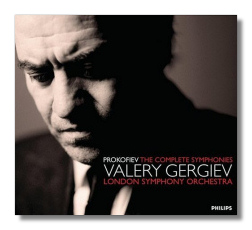
The Internet's Premier Classical Music Source
Related Links
- Prokofieff Reviews
- Latest Reviews
- More Reviews
-
By Composer
-
Collections
DVD & Blu-ray
Books
Concert Reviews
Articles/Interviews
Software
Audio
Search Amazon
Recommended Links
Site News
 CD Review
CD Review
Serge Prokofieff

Complete Symphonies
- Symphony #1 in D Major, Op. 25 "Classical"
- Symphony #2 in D minor, Op. 40
- Symphony #3 in C minor, Op. 44
- Symphony #4 in C Major, Op. 47 (original version)
- Symphony #4 in C Major, Op. 112 (revised version)
- Symphony #5 in B Flat Major, Op. 100
- Symphony #6 in E Flat minor, Op. 111
- Symphony #7 in C Sharp minor, Op. 131
London Symphony Orchestra/Valery Gergiev
Philips 4757657 4CDs: 50:56, 66:42, 64:54; 72:39
This is the tenth cycle of Prokofieff's symphonies. The previous nine, in roughly chronological order, were conducted by Rozhdestvensky (Melodiya), Martinon (Vox), Weller (Decca), Kosler (Supraphon), Järvi (Chandos), Rostropovich (Erato), Kitayenko (Melodiya), Ozawa (DG), and Kuchar (Naxos). This latest effort boasts one of the world's hottest conductors, both on the concert stage and in the opera house, leading one of London's finest orchestras. The London Symphony is also one of the most recorded orchestras in history. But to get to the point of this piece: How does this cycle rank with the others?
Derived from live performances from May, 2004 at London's Barbican Centre and featuring excellent sound reproduction and quiet audiences, this may well be the set to get, if you want all the Prokofieff symphonies in one package. Gergiev, the new principal conductor of the LSO, by the way, and a devotee of the music of Prokofieff – he is doing all eight Prokofieff operas for Philips (only two remain at this juncture). He plays both versions of the Fourth Symphony, like Järvi and Rostropovich, but unlike them, is less wayward in his readings here. Järvi, to me, often used annoying rubato (especially in the later version of the Fourth), and conveyed a sense of detachment, while his orchestra at times had a scrawny sound. Still, he had a pretty good cycle to offer the buyer. Rostropovich was slow and often just plain dead in his readings, offering little of interest to the public.
Gergiev is better than both, even if his orchestra isn't always completely up to the task here: I don't find the oboist in the 6th convincing, especially in the crucial first movement funeral march, and the playing lacks clarity in the opening minutes of the Sixth's Largo. In general, one might note sloppy ensemble work here and there throughout the cycle. Overall though, the playing is more than adequate and the London Symphony players perform with plenty of spirit. But, most importantly, Gergiev's readings not only rival the best in the other cycles, but in the individual issues as well: his Sixth can stand with Mravinsky's on Praga – in fact, I'd take Gergiev over Mravinsky in the great Op. 111 – and his Fifth rivals those of the two by Bernstein, the Levi, Weller, Ormandy (Columbia, not his later RCA), and Maazel – forget the unaccountably-praised Karajan.
Gergiev's Op. 47/112 Fourth is consistently good, and his Second may be the finest ever recorded. The Second, I believe, and the Sixth are Prokofieff's greatest symphonies, and here the readings are splendid. The Classical is fine, too, but then who ever delivers a less than marvelous recording of this masterpiece? The Seventh gets a fine performance as well, coming across a little darker than most listeners are accustomed to, and all the better for that.
Yet, Gergiev sometimes italicizes things with a lack of subtlety: the climax to the Sixth's development has thudding drums dominating the proceedings with crushing power, a power that should also feature gong blows of shattering impact. Still, this section comes across with the requisite sense of drama and tragedy, and is ultimately quite convincing. Only the Third may be slightly problematic here: Gergiev's tempos are fast in the first movement, and especially fast in the brutal march that climaxes the development section. In the opera The Fiery Angel, from which this symphony is derived, this march is played significantly slower, and most conductors – Järvi, Ozawa, and Rostropovich among the cyclists, and Leinsdorf and Muti among the non-cyclists – conduct it with more weight and at a slower tempo – and to greater effect.
Still, Gergiev is compelling in the Third, if a bit overheated. Overall, he must be judged the best among the cyclists, offering the finest readings of the Second and probably of the Sixth. If I had to rank all the cyclists here, I would place them in this order, with Kitayenko counted out since I have only heard one issue from his set (the later Fourth): Gergiev, Weller, Järvi, Kuchar, Ozawa, Rozhdestvensky, Kosler, Martinon (who might have rated higher with a better orchestra and better sound) and Rostropovich. Therefore, I must give this Gergiev set my highest recommendations. It is thus a most important collection, since Prokofieff is arguably among the greatest symphonists of the 20th century, despite what some musicologists will claim about the composer's superior stage inclinations. Does success in ballet, opera and films preclude success in the realm of the symphony? I think not.
Copyright © 2006, Robert Cummings




















